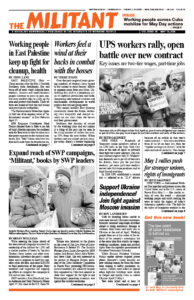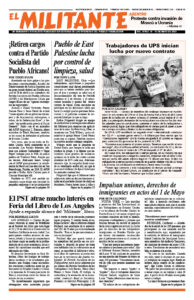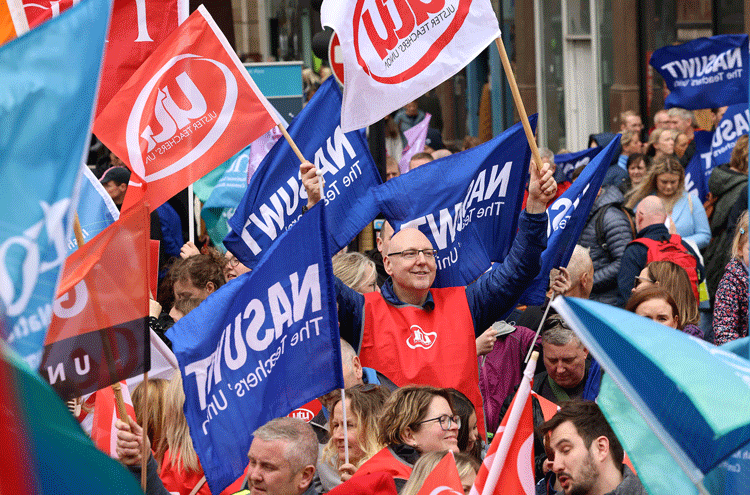DUBLIN, Ireland — Marking the 25th anniversary of the Good Friday Agreement, U.K. Prime Minister Rishi Sunak went to Belfast to sell his government’s latest attempt to stabilize British rule in Northern Ireland. President Joseph Biden also toured Ireland, touting Washington’s role in the signing of the pact.
Adopted on April 10, 1998, the agreement registered advances in the struggle to end the second-class status of Catholics imposed by the British rulers and steps forward in the struggle for Irish unity. London was forced to dismantle much of its repressive apparatus. Northern Ireland remained part of the U.K., and an assembly and executive were established there with power over health, education and other matters. Both Biden and Sunak urged the restoration of the assembly, currently boycotted by the main pro-British unionist party.
In recent years forces favoring the unification of Ireland have gained ground in capitalist politics and are pushing for a referendum in the North and South to end the partition imposed by the British rulers more than a century ago.
Members of the Communist League in the U.K. visited Belfast and Dublin to discuss with fellow toilers the common struggles workers face as bosses try to offload the crisis of their system onto our backs. This included discussing prospects for the unification of Ireland.
“It’s best to keep things as they are,” Aaron Dowd, a housing estate caretaker in Ballymun, Dublin, said when we asked his opinion about calls for a referendum. “There’s peace now and an open border. If you try to push things too far, some people are going to get upset.”
“The crisis of British rule in Northern Ireland today is a product of struggles by working people, especially the fight by Catholics in the North against their second-class status,” CL member Catharina Tirsén said. “And it shows the weakening of British imperialism.”
“Good!” Dowd responded. “I have no problem with that.”
“The Communist League calls for an end to British rule,” Tirsén said. “This would strengthen the fight for working-class solidarity and efforts to organize the forces that can lead the struggle for workers and farmers governments in both Britain and in Ireland.”
Dowd subscribed to the Militant and bought a copy of The Low Point of Labor Resistance Is Behind Us. “We can definitely do something to change things,” he said after seeing the Militant’s coverage on the struggle of working people in East Palestine, Ohio.
Common struggles by workers from Catholic and Protestant backgrounds in Northern Ireland, as well as by growing numbers of immigrant workers, became more possible after the Good Friday Agreement.
It “was the best thing that ever happened,” retired worker Paddy Rooney told us in Belfast. “It stopped the killings. This area was like a war zone. You used to have soldiers stop and search you on every corner.”
For decades, British rule in Northern Ireland rested on pitting Protestants and Catholics against each other. Massive struggles against anti-Catholic discrimination in employment, housing, education and voting rights erupted at the end of the 1960s. To quell the rising movement, the U.K. government sent in thousands of troops, but successive governments failed to crush the struggle for civil and national rights.
Classroom assistant Bronagh Cahill said she thought that changes over recent decades have opened space for working people. “I’m just old enough to remember soldiers on the streets when I was a child,” she said. “It helps to see how far we’ve come. Not so long ago talk of a poll on whether to unify Ireland was unthinkable.”
Like others in the area, she was picked up by recent labor struggles. Many of those we spoke to had seen nurses’ picket lines during their recent strikes. “People aren’t willing to accept things anymore,” Cahill said.
Teachers across Northern Ireland carried out a one-day strike April 26, affecting state, church and independent schools, which are still largely segregated along Catholic-Protestant lines. Unions that have taken part in previous rounds in the long-running fight over wages, staffing and conditions — the historically pro-British Ulster Teachers Union, the all-Ireland Irish National Teachers Union and a union that organizes teachers across the U.K. — were joined by two more teachers unions.
Thousands of teachers and other public sector workers on strike that day took part in a rally at Belfast City Hall called by all nine striking unions. The strikes coincide with long-running fights by teachers and nurses in England.


